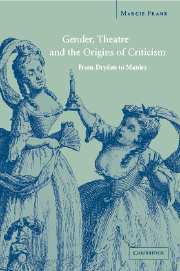Book contents
- Frontmatter
- Contents
- Acknowledgments
- Introduction. The critical stage
- 1 “Equal to ourselves”: John Dryden's national literary history
- 2 Staging criticism, staging Milton: John Dryden's The State of Innocence
- 3 Imitating Shakespeare: gender and criticism
- 4 The female playwright and the city lady
- 5 Scandals of a female nature
- Notes
- Bibliography
- Index
2 - Staging criticism, staging Milton: John Dryden's The State of Innocence
Published online by Cambridge University Press: 22 September 2009
- Frontmatter
- Contents
- Acknowledgments
- Introduction. The critical stage
- 1 “Equal to ourselves”: John Dryden's national literary history
- 2 Staging criticism, staging Milton: John Dryden's The State of Innocence
- 3 Imitating Shakespeare: gender and criticism
- 4 The female playwright and the city lady
- 5 Scandals of a female nature
- Notes
- Bibliography
- Index
Summary
In 1677 John Dryden published The State of Innocence and the Fall of Man, an operatic rewriting of John Milton's Paradise Lost that he had probably completed four years earlier. In his preface, “The Author's Apology for Heroic Poetry and Poetic Licence,” Dryden indicates that criticism depends on the critic's identification with the writer he is examining. Milton, however, provides a particularly recalcitrant site for such an assumption: the only acceptable condition under which Dryden could identify with him would be if Milton's poem were no longer regarded as a vindication of revolution or regicide. Consequently, Dryden must produce a literary transformation of Milton, one that masks the political differences between them.
Dryden's The State of Innocence accomplishes this goal, rewriting Milton in ways that explicitly contradict Milton's understanding of heroic poetry. By translating Milton's blank verse into rhyme and his epic narrative into dramatic form, Dryden separates both the man and his authoritative stylistic choices from the poem he wrote. Because Milton's choices make manifest his theological-political-literary authority, Dryden's revision of them necessarily reconstitutes that authority. He thereby makes discursively available Milton's work, divorced from his political beliefs, recasting it as a literary contribution to a native tradition. In “The Author's Apology,” and in Dryden's subsequent writings about Milton, he develops a set of critical terms that sustain the separation of Milton's poetic achievement from his politics.
- Type
- Chapter
- Information
- Gender, Theatre, and the Origins of CriticismFrom Dryden to Manley, pp. 42 - 63Publisher: Cambridge University PressPrint publication year: 2002



